- Home
- David Downing
Masaryk Station (John Russell) Page 17
Masaryk Station (John Russell) Read online
Page 17
The responsibility for such decisions could only be borne by the Party. An over-reliance on democratic procedures would open the door to a bourgeois resurgence, with all that that implied. The workers would again be seduced by the one big lie, that the free-for-all was fair to all, when in fact it was just a lottery, and a heavily rigged one at that.
No, they couldn’t go down that route. The Party would consult of course—no worker’s voice would go unheard—but since it alone spoke for all, it had to have the final say. There would have to be safeguards against abuses of power, but the power itself could not be questioned. Not yet.
It was a delicate balance that had to be struck and, not surprisingly, there was some disagreement as to how that should be accomplished, with some delegates arguing for more openness inside the Party, others less inclined to see the need. Ströhm was in the former camp, and might have argued his case a trifle too forcibly, for that evening, after another sumptuous dinner, he was publicly taken to task by Hans Gerstein, one of the two Central Committee members who were attending the conference.
‘You people who spent the war at home,’ Gerstein began. ‘All very heroic, no doubt, but hardly a learning experience. While you were hiding from the Gestapo, those of us lucky enough to be in Moscow were learning how to run a country. Yet here you all are, looking down your noses at us!’
He was more than a little drunk, but Ströhm could see he meant it. ‘Surely we can talk openly among ourselves?’
‘A naive point of view, Comrade Ströhm. Any divisions weaken us. Unity is everything. We must accentuate what unites us, not what divides us.’
‘If we don’t talk things through in an open manner, how can we sure we have reached the right decisions?’
Gerstein snorted. ‘Are you no longer a Marxist-Leninist? The Party is the agency of history—its decisions have to be right.’
Ströhm refused to be cowed. ‘I expect the Yugoslav Party leaders are saying much the same thing.’
Gerstein’s face turned an angry red. ‘It takes more than a few adventurers to forge a true communist party. What have these comrades ever done but kill honest German soldiers?’
Soon after six on Saturday evening a DEFA limousine arrived to take Effi and Thomas across town for the premiere of The Peacock’s Fan. With Russell away, Effi had been resigned to the lack of an escort, but when Thomas let slip that Hanna was away visiting her parents, she had successfully inveigled him into the role.
On the ride he seemed quieter than usual, and it suddenly occurred to her that he might be nervous about entering the Soviet sector.
He laughed at the suggestion. ‘God, no. The day I’m frightened to go anywhere in my own city is the day I’ll leave. What gave you that idea?’
‘You haven’t said a word since we left.’
‘Oh, I suppose I haven’t. I’m sorry. Just wretched politics—I’m beginning to regret ever standing for election.’
‘Do you want to talk about it?’
‘Why spoil the evening?’ He smiled. ‘You look fantastic, by the way.’
‘Thank you,’ she said, looking down at the low-cut burgundy dress. She had taken a lot of trouble, and for one particular reason—Tulpanov had said he would be there tonight. If she knew him, and she thought she did, then he was one who might be swayed by other things than reason.
Since Tuesday, barely an hour had gone by without her picturing Eva Kempka in a prison cell. But what could she actually do? She had telephoned everyone she could think of who might know Eva, but nobody had heard anything. She had called the police in all four sectors, and made a physical nuisance of herself at the three Western sector HQs. The only reason she hadn’t made her presence felt in the Soviet sector was a realisation that she wouldn’t help Eva by sharing her fate.
Tulpanov was the only high-ranking Soviet official with whom she was on speaking terms, and somehow or other she would make him listen. As she and Thomas were shown to their seats, she looked around for the Russian, but the rows at the front, the usual preserve of Soviet officials and guests, were still largely empty.
Surveying the scene, she had to admit that the cinema looked the part. It had been one of Berlin’s seediest in the 1930s, and the last time she’d walked down Neu König Strasse it hadn’t been much more than a shell. But the Russians had restored whatever grandeur it had once possessed, and added some more of their own besides. They might have given up on making better films than the Americans, but they could still out-do them when it came to glitter and pomp.
But where was the master showman? Effi was beginning to worry that Tulpanov wasn’t coming, when he suddenly appeared, striding down the aisle amidst a coterie of uniforms. As he took his seat in the front row the lights submissively dimmed.
Effi hadn’t yet seen a final cut, and the film was even better than she’d thought it would be. Watching its subtle interplay of ideas and emotions against an all too believable historical backdrop, she wondered what the officials three rows down were thinking. Could they not see the difference—the enormous difference—between this and A Walk into the Future?
When the credits rolled, Thomas turned and gave her a smile. ‘That was excellent,’ he said, like someone whose heart and mind had just been fed.
‘And how was I?’ Effi asked.
‘Oh, you’re always good.’
Tulpanov and coterie were already filing out to the lobby for the presentations. ‘Thomas,’ Effi said in a whisper. ‘I may be about to cause a bit of a stir. You might want to head straight for the limousine and wait for me there.’
Thomas shook his head. ‘What will you be making a stir about?’
‘That woman I told you about—the one who knew Sonja Strehl and thinks there was something suspicious about her death. Now she’s disappeared, and I’m going to ask Tulpanov if he knows anything about it.’
‘And why would I want to miss that?’
‘Thomas!’
‘They could hardly like me less than they do already, and they’re not going to start arresting people tonight, not after they’ve put on a show like this. But what exactly do you have in mind?’
‘I don’t know really. I was going to play it by ear.’
‘Okay, but in my experience the only way to talk to the Soviets is one-on-one, preferably with no one else in earshot. If you try and show them up in public they either get abusive or turn into hedgehogs—they certainly don’t listen.’
Which did sound sensible, Effi thought. And when the time came, and Tulpanov was standing in front of her, happily admiring her cleavage, she spoke accordingly. ‘Comrade, I need to talk to you again on a matter of some urgency. After you have finished here, in the manager’s office perhaps.’
He looked slightly nonplussed. ‘I thought we had sorted this out. I have another appointment.’
‘It’s either you or the newspapers,’ she told him.
That focused him. ‘Very well,’ he said, his voice suddenly colder.
Half an hour later, she found him and another Russian waiting for her in the office. The latter was hovering at Tulpanov’s shoulder like a teacher intent on keeping close watch on a potentially unruly pupil.
‘I wanted a private conversation,’ she said.
He shrugged. ‘That will not be possible.’
‘All right. Did you know that the makeup artist on the film you just watched was kidnapped last weekend from her flat in the American sector?’
‘No, I didn’t.’
‘Well she was. By two men who said they were policeman. One was German, the other probably Russian. From the description someone gave me they sound very much like the two who tried to arrest me. And I can find no record of her being taken to any police station in Berlin, in any sector. I will take the matter to the press, but because I respect you and all you have done for the arts in this city, I wanted to speak to you first, and see if you can shed any light on my friend’s disappearance.’
He said nothing for a few moments, as if carefully g
auging his response. ‘We do not kidnap makeup artists,’ he said eventually. ‘Why on earth would we?
‘She was a friend of Sonja Strehl, and she’s been making enquiries into Sonja’s death—she doesn’t believe it was suicide, and the people she was harassing may have decided that giving her a scare would shut her up.’
While Tulpanov considered this, the other Soviet official just stared at Effi. He wasn’t looking at a woman, she though, just at a piece of meat.
‘I will look into this,’ Tulpanov said, with obvious reluctance. ‘In the meantime, I strongly advise you not to repeat these anti-Soviet accusations in public. And especially not to the Western press. As tonight’s film showed, you have done wonderful work for us—for DEFA, I mean—and I would hate to see such a mutually beneficial relationship come to an end. Let me look into it, before you do anything which can’t be undone.’
It was all she was going to get. She wanted to explode with anger, but that wouldn’t help Eva, so she thanked him for talking to her, and promised to hold fire until she heard from him again.
Tulpanov took her hand and kissed it. ‘I hope we shall meet again,’ he said, the stiffly spoken words starkly at odds with an almost fatherly look of warning. He would have made a good actor, she thought.
‘Any success?’ Thomas asked, once they were in the limousine.
‘Not really. He promised to investigate, but I got the feeling that he doesn’t have that sort of clout anymore, if he ever did. The man who was leaning over him on the other hand …’
‘MGB?’
‘I suppose so. Thomas, what else can I do?’
‘When’s John back?’
‘Sometime this week.’
‘His Soviet friends might be able to help.’
‘They might,’ Effi agreed, with more hope than conviction.
The final session of Ströhm’s conference was concerned with Culture and Sport, two subjects which would normally have interested him. This time though, he gave them a miss, and went for a walk on the beach. A couple teaching their infant son to swim reminded him of his own impending fatherhood, and brought a smile to his face. At first he had wanted a boy, but over the past few days the idea of a daughter had become more appealing.
Cilly had been on his mind lately; Cilly, the first love of his life. The Gestapo might have hurled her to her death from a fourth-floor window, but she still lived on in his memory, and, through the influence she retained over him, still played her part in the world. Ströhm wondered what she would think of their Party now, and how she would judge his own increasing uncertainty. She wouldn’t want him to walk away, to give up—that much he knew. But neither would she want him to lose touch with those gut feelings which had anchored their shared beliefs—the hatred of injustice, of a system in which the pleasures of the few were bought with the pain of the many.
Somewhere in all of this was a line he couldn’t cross without betraying her, without betraying himself. He still wasn’t yet clear where that line was, but he now had no doubt it existed. My Party, right or wrong, was no longer an option.
Russell’s train pulled into Prague’s Wilson Station—named after the US president who had sponsored Czechoslovak independence—soon after three on Friday afternoon. The Nazis had called it something else during the war, but he couldn’t remember what.
Both here and at the border crossing, the number of men in uniform had tripled since his last visit, and considering the swastikas hanging everywhere back then, that was some achievement. So far icy politeness was the worst he had suffered, but there was plenty of time. And it wasn’t the ones in uniform, he reminded himself, who constituted the real enemy. The Státni bezpečnost, or StB, had built itself a fearsome reputation when the post-war coalition was still in charge, and now that the communists were ruling alone, the gutter was presumably the limit.
It was a cool spring afternoon, the sun flitting between clouds. He walked across to Wenceslas Square, then down the wide Václavske Náměstí to the Europa Hotel, already aware of being followed. When he’d stayed there in 1939 the desk clerk had been a male fan of Kafka’s; now it was a stick-thin woman who looked like she’d just eaten a lemon. But she agreed to his renewing his acquaintance with his old room, which overlooked the boulevard from the third floor. He had survived his previous stay there, which might be a good omen. With any luck he’d be in Berlin by Wednesday, back where at least a few people loved him.
After a bath he dressed and went back down in the lift, intent on seeking out a restaurant he remembered, but was accosted halfway across the lobby by a smartly dressed woman in her twenties, with short black hair and a catlike face.
‘John Russell?’ she asked, though he didn’t imagine she had any doubt. ‘My name is Petra Klíma, from the Ministry of Culture. Could we talk for a few minutes?’ She gestured towards a couple of armchairs in the farthest corner of the lobby.
‘Of course,’ Russell said equably. Her English was excellent.
‘I know you have your schedule,’ she said, once they were seated, ‘and nothing has changed in the arrangements which the Ministry agreed with your magazine The Lampadary, so you have no reason to worry.’ She smiled. ‘Which is good.’
‘It is,’ Russell agreed, wondering exactly where this was going.
‘If there are any problems, or if you have any special needs, then call me on this number.’ She passed across a hand-cut piece of cardboard on which some figures had been scrawled.
‘Thank you.’
‘That is all I need to say. But for my own curiosity, I wonder if I could ask you a question about your magazine. The name—what does it mean?’
‘In the old Greek church a lampadary carried a flaming taper to light the way for his patriarch,’ Russell explained. This had been included in his CIA briefing sheet, along with other information about the Agency’s newly created—and paradoxically long-standing—arts journal.
‘I see,’ Klíma said. ‘Whose idea was that—the owner’s?’
Which was seamless enough for a Hollywood script, Russell thought. ‘The Lampadary doesn’t have one,’ he told her, following his own. ‘It’s owned by a cooperative—a group of Americans who believe that art transcends politics, and can act as a unifying force.’
‘But how can art not be political?’ she wanted to know.
‘Mozart? Van Gogh?’
Klíma looked doubtful. She probably thought despair at the condition of the Dutch proletariat had taken Vincent out to the cornfield. ‘Perhaps music and painting,’ she reluctantly conceded, ‘but poetry, literature?’
‘ “When a talk about trees is a crime, because it implies silence about so many horrors”,’ Russell quoted Brecht.
‘Yes, yes. That is what I mean.’
‘Well, these are the sort of questions I want to explore in my interviews,’ Russell told her. ‘How artists use their individual talents in the service of the community,’ he added glibly. ‘That’s what The Lampadary is all about.’
‘I shall look forward to reading it,’ she said, getting to her feet.
Which was more than he would, Russell thought, as he walked through the Old City in search of his restaurant. He found a building he thought he recognised, but the boards nailed across the ground-floor frontage offered no clue to its former use, and he had to settle for another establishment, a few metres farther along. This, like his hotel, seemed strangely empty, but it couldn’t be the menu to blame—Prague had suffered relatively little in the war, and if the dishes on offer at this restaurant were any guide, the economic situation was a lot better here than it was in Berlin or Vienna.
After eating, he ambled back to his hotel. The streets were subdued, as if Sunday had come a day early, and even with the window open, it was quiet enough for an early night.
He was up too early for a hotel breakfast, but a café was open just down the street. His first interview—with a female poet he’d never heard of—was scheduled for eleven A.M. at the Charles University, which he
reckoned gave him enough time to visit the Soviet Embassy. A tram carried him north across the Štefánika Bridge, and a short walk down Pod Kastany brought him to the Embassy gates.
The preceding ten years—and Shchepkin’s patient tutoring over the past three—had vastly honed his skills when it came to dealing with Soviet officialdom, and he emerged only fifteen minutes later with the local MGB emergency number for Soviet agents in distress. After his tram dropped him at the eastern end of the Charles Bridge, he walked across the river and up the hill, arriving at the university with ten minutes to spare.
The poet, a woman in her fifties, was a delight. A lifelong communist with an apparently bottomless faith in human possibility, she had met and befriended several of the current government at university in the years following the First War. She cheerfully admitted that a few might succumb to megalomania, but insisted the others would sort them out. This, as she said with a laugh, wasn’t Poland; this was country with a long industrial history, and a politically conscious working class to prove it. As for the arts, there might be some temporary limits, but the eventual flowering would be more than worth it.
The conductor, whom he interviewed that afternoon in a well-appointed Old City apartment, was pleasant enough but far less interesting. His recent adherence to the Party, Russell quickly realised, had less to do with ideology than Soviet sponsorship of his chosen field. While the Nazis had belittled Smetana and Dvorak, the Soviets had presided over the post-war resurrection of these two Czechs in particular and classical music in general. The way this conductor talked, one could be forgiven for thinking that Stalin had personally driven a van-load of surplus violins all the way from Moscow.

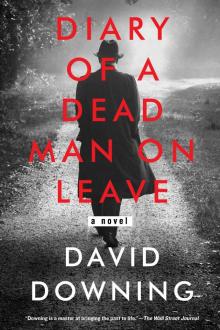 Diary of a Dead Man on Leave
Diary of a Dead Man on Leave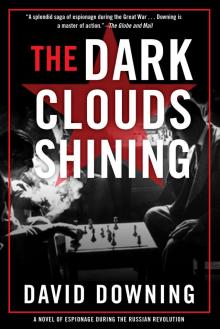 The Dark Clouds Shining
The Dark Clouds Shining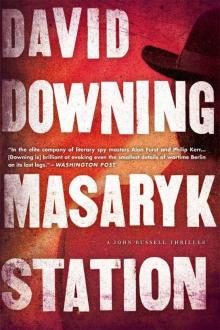 Masaryk Station (John Russell)
Masaryk Station (John Russell)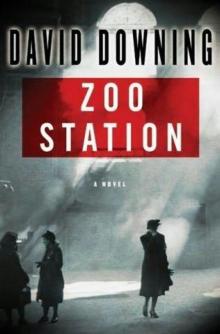 Zoo Stationee
Zoo Stationee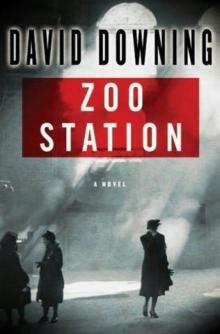 Zoo Station jr-1
Zoo Station jr-1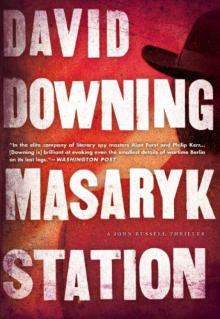 Masaryk Station
Masaryk Station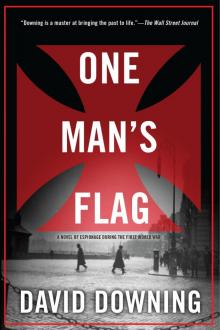 One Man's Flag
One Man's Flag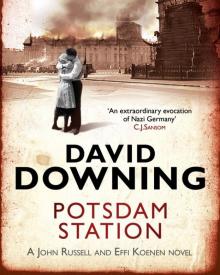 Potsdam Station jr-4
Potsdam Station jr-4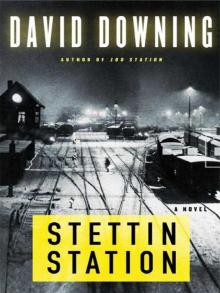 Stattin Station jr-3
Stattin Station jr-3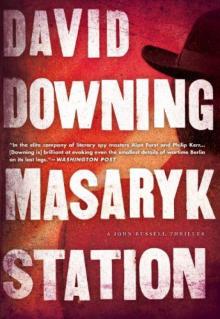 Masaryk Station jr-6
Masaryk Station jr-6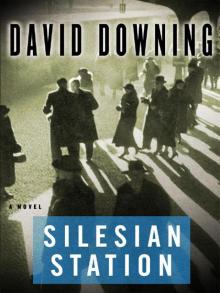 Silesian Station (2008) jr-2
Silesian Station (2008) jr-2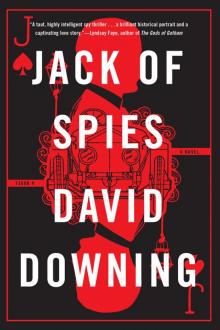 Jack of Spies
Jack of Spies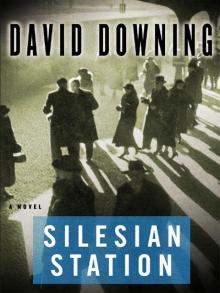 Silesian Station (2008)
Silesian Station (2008) The Moscow Option
The Moscow Option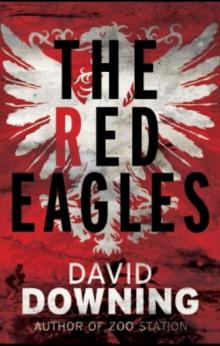 The Red Eagles
The Red Eagles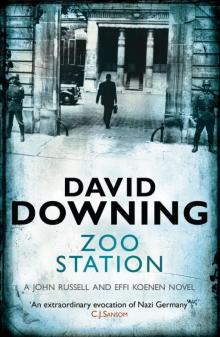 Zoo Station
Zoo Station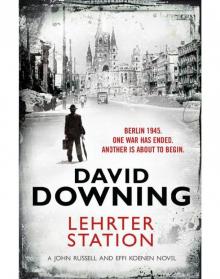 Lehrter Station
Lehrter Station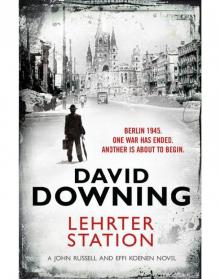 Lehrter Station jr-5
Lehrter Station jr-5